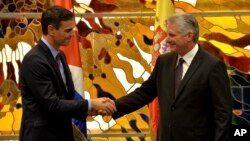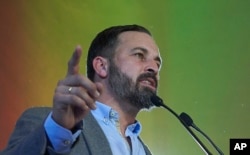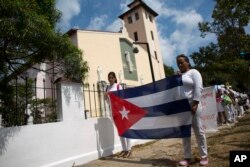Leaders of Spain's seven-month-old socialist government are being forced to explain their intentions after a high-profile visit to Cuba by Prime Minister Pedro Sanchez.
Aides to Sanchez, who pledged to "deepen" ties with the Communist-led island during the late November visit, insist the trip was intended to boost Spain's financial interests and promote dialogue. But Spanish opposition parties accuse the prime minister of turning a blind eye to human rights and abandoning his predecessors' effort to promote change in the former Spanish colony.
Some of the most virulent criticism has come from Santiago Abascal, head of a rising far-right movement which scored an upset victory in a Dec. 2 regional election. He has denounced Sanchez as an "accomplice" of "Castro-Chavismo" — a term used to describe what some conservatives see as an alliance between Cuba and Venezuela to spread leftist authoritarianism.
Albert Rivera, head of the centrist Citizens' Party, has decried Sanchez's "fanciful posturings with violators of human rights." And officials of the center-right Popular Party similarly accused Sanchez of ignoring human rights and demanded that he do better during a visit to Madrid by China's President Xi Jinping that followed the Cuba trip.
Government officials say that their priority is promoting trade. They are eager to open markets in China, which runs a $20 billion trade surplus with Spain and owns a portion of its public debt. Spain also has economic interests in Cuba where some of its major hotel companies are heavily invested.
Since assuming office in May, Sanchez has focused on repairing ties with leftist governments which deteriorated under former prime minister Mariano Rajoy. Rajoy's Popular Party government had supported the U.S. policy of isolating Cuba and Venezuela and was sharply critical of their policies.
When called in for Senate questioning, Foreign Minister Josep Borrell defended his government's engagement with Cuba and Venezuela as a way to promote democratic changes. A memo signed in Havana by Sanchez and Cuban President Miguel Diaz-Canel calls for annual consultations in which human rights will be on the agenda.
But days before the Havana trip, representatives of Sanchez's Socialist Party voted in the European Parliament against a resolution calling on Cuba to stop persecuting its opponents. The resolution also urged Havana to stop "imposing censorship online by blocking internet sites for the sole purpose of limiting political criticism and restricting access to information."
Cuban dissidents
Critics also point out that Sanchez failed to meet with Cuban dissidents despite requests by opposition groups on the island including the "Ladies in White," an internationally recognized association of mothers and spouses of hundreds of political prisoners.
The last Spanish prime minister to visit Cuba, Jose Maria Aznar who traveled there to attend an Iberian-American summit, met with dissidents despite loud objections by then-president Fidel Castro. U.S. President Barack Obama also met with dissidents during his visit in 2015.
Spanish diplomatic officials say Sanchez managed to persuade Diaz-Canel to modify new restrictions on economic freedom, which are alarming thousands of Spanish small businessmen who were drawn to Cuba by a recent opening to small-scale private initiatives.
According to a foreign ministry source, Spanish construction companies also want better access to Cuba's market after watching French and German firms snap up recent contracts, including for an expansion of Havana's airport.
EU sanctions
The Sanchez government has also softened Spain's support for EU sanctions on Venezuela, which has responded to a collapsing economy with help from Cuban security advisers and Chinese loans.
At a meeting of European foreign ministers last month, Borrell opposed further sanctions on Venezuelan officials accused of supervising mass arrests, as proposed by former prime minister Rajoy.
The EU external affairs council released a statement which refrained from blaming President Nicolas Maduro for the crisis that has seen some 3 million refugees flee Venezuela. It called, instead, on the opposition to hold a "dialogue" with the government to resolve a " breakdown in the institutional order."
But Venezuelan opposition leaders say they are not interested in new talks with Maduro. Exiled Caracas mayor Antonio Ledezma says any further negotiations would serve only to legitimize the government as it steps up repression with mass arrests.
Sanchez has also been slow to criticize the Sandinista government in Nicaragua, which is being investigated by the United Nations and Organization of American States over hundreds of alleged extrajudicial executions. He made no mention of the issue at this year's Iberian American summit in Guatemala, declaring instead that Latin America is free of the "xenophobic" and "racist" discourses "afflicting" the United States and Europe.






